Key takeaways:
- Reparations politics encompasses justice and restitution for historical injustices, emphasizing the need for dialogue, education, and community engagement.
- Effective proposals require clarity, inclusivity, and robust evidence to resonate with and address the needs of marginalized communities.
- Gathering credible sources and understanding community needs are essential for developing impactful reparations proposals that truly reflect the priorities of affected populations.
- A tailored research approach that considers intersectionality and combines qualitative and quantitative methods enhances the understanding of community dynamics and needs.

Understanding reparations politics
Reparations politics involves a complex conversation about justice and restitution for historical wrongs, particularly related to slavery and systemic discrimination. I remember a time when I first truly grasped the emotional weight of this issue while attending a community forum. Hearing personal stories about the intergenerational impact of oppression made it clear to me that this isn’t just about financial compensation; it’s about acknowledging pain and fostering healing.
Engaging in reparations politics forces us to confront the uncomfortable realities of history. Have you ever paused to think about how our past continues to shape our present? For me, reflecting on the socioeconomic disparities that persist today—rooted in centuries of injustice—highlighted the urgency of this conversation. It’s crucial that we recognize the importance of reparative measures as a step towards equitable society.
The discourse surrounding reparations is not only about financial reparations but also about restoring dignity and creating opportunities for communities that have been historically marginalized. I often find myself questioning how we can genuinely address such deep-seated issues in a meaningful way. The importance of dialogue, education, and community engagement becomes clear when we understand that reparations politics is a vital step toward addressing historical inequities and fostering a just future.
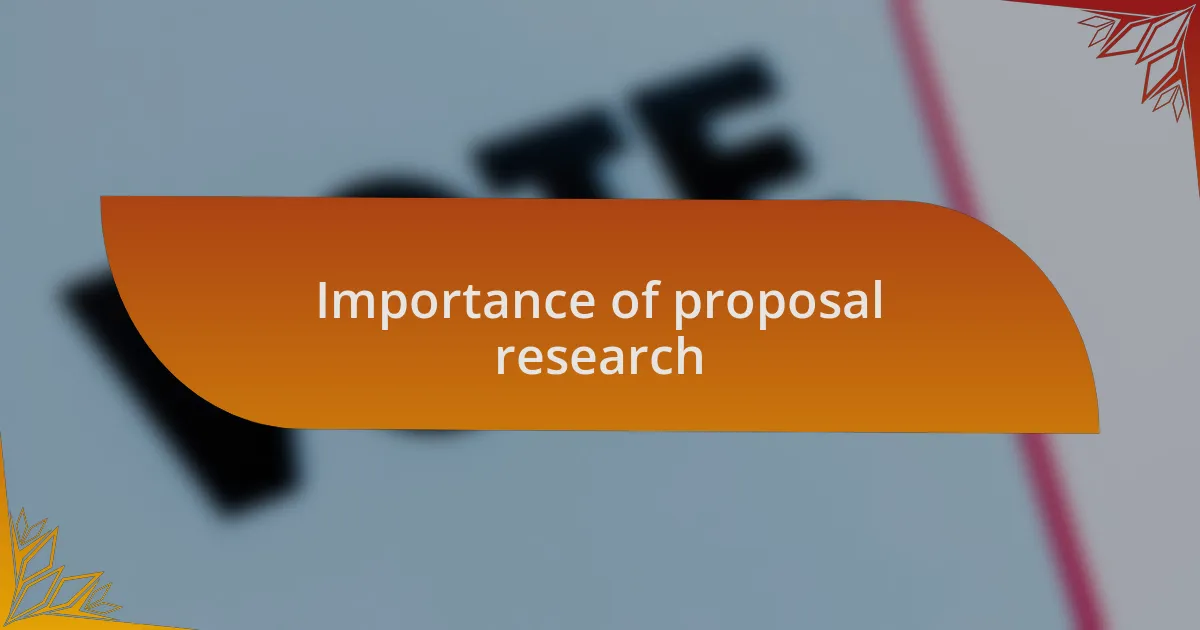
Importance of proposal research
Proposal research is the backbone of effective advocacy in reparations politics. Having spent hours sifting through historical documents and contemporary case studies, I’ve learned that understanding the nuances of past injustices is essential for formulating actionable proposals. It’s curious how the depth of this research reveals not only what has been done wrong but also what successful reparative initiatives can look like in the future.
When I first began delving into this area, I was surprised to see how much factual evidence informed public sentiment and policy-making. Each proposal stands on the shoulders of thorough research, which can illustrate historical contexts and potential impacts. Have you ever considered how a well-informed proposal might resonate with both skeptics and supporters? I believe that a comprehensive approach not only strengthens the case for reparations but also creates a roadmap for healing and reconciliation.
I often reflect on the phrase, “knowledge is power,” especially in the context of reparations politics. Without diligent proposal research, we risk falling into the trap of misrepresentation or oversimplification of complex issues. I once attended a workshop where research sparked invigorating debates; witnessing the power of knowledge shift opinions was a profound reminder that our ideas must be rooted in diligent inquiry if we are to influence hearts and minds effectively.
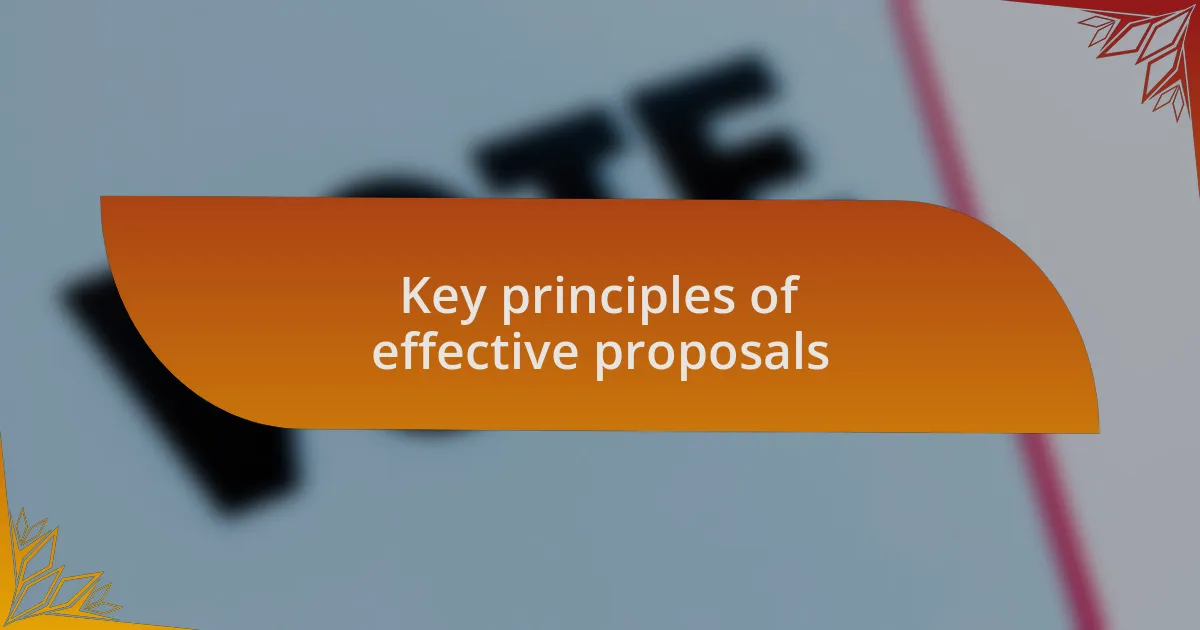
Key principles of effective proposals
One of the key principles of effective proposals is clarity. When I crafted my first proposal, I learned quickly that ambiguity can drown out powerful ideas. If the goals and methods of the proposal aren’t clearly defined, it can leave potential supporters confused or disinterested. How can any proposal make an impact if it doesn’t communicate its purpose straightforwardly?
Another vital aspect is the importance of inclusivity in the research process. I’ve found that engaging with diverse communities not only enriches the proposal but also builds trust. One memorable discussion I had with community leaders revealed perspectives I hadn’t considered at all; it was a game changer. By incorporating a wide array of voices, proposals can resonate more authentically and address the needs of those most affected by past injustices.
Lastly, a proposal must be evidence-based. I remember presenting a draft that felt compelling, but it fell flat when challenged by questions I hadn’t prepared for. That experience drove home the necessity of robust data to support claims. Whether through statistical analysis or anecdotal evidence, having concrete facts reinforces the argument and shows a commitment to truth. After all, wouldn’t you feel more compelled to support a proposal that demonstrated solid backing rather than one merely based on feelings?
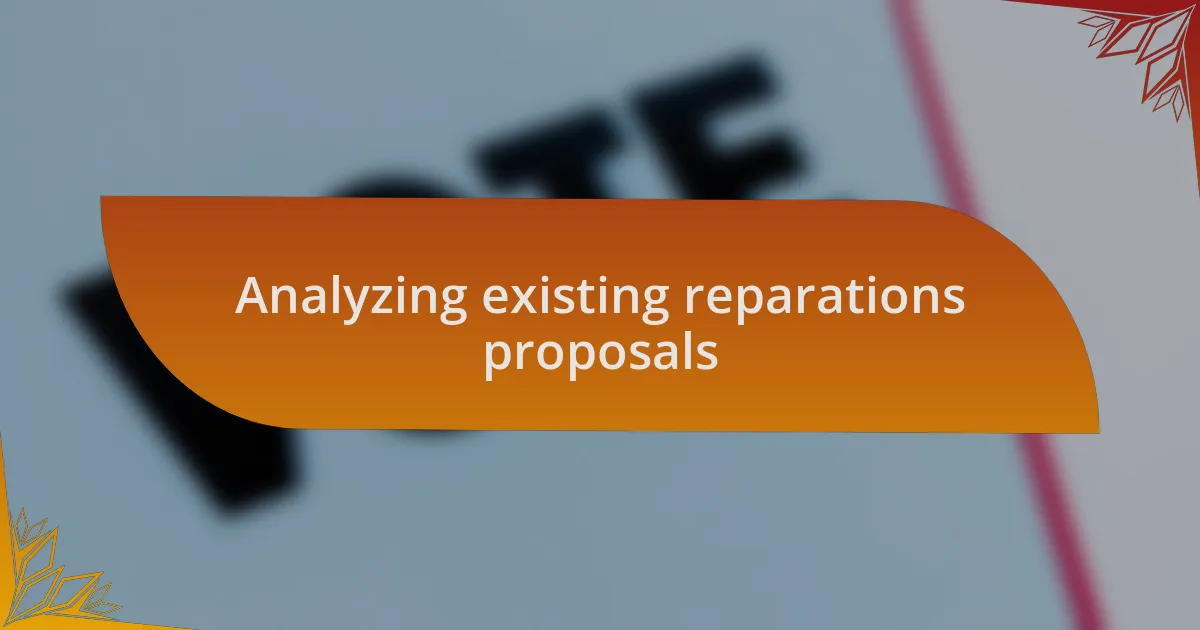
Analyzing existing reparations proposals
In examining existing reparations proposals, it’s vital to scrutinize their foundations. I remember diving into a proposal that suggested cash payments as compensation. Initially, it sounded great, but I quickly realized that without addressing systemic barriers, such as access to education and healthcare, simply giving money wouldn’t create sustainable change. It made me question, can we truly claim to repair the past if we ignore the structures that maintain inequality today?
Another noteworthy aspect to consider is the variety of approaches different proposals take. I once came across a local initiative that focused on land restitution rather than financial reparations. This approach not only acknowledged historical injustices but also aimed to empower communities through self-determination. It sparked a thought in me: shouldn’t reparations be more than just compensation? Shouldn’t they also foster agency and future equity?
Finally, I’ve found that some proposals lack a clear timeline for implementation, which can be a significant drawback. This reminds me of a project I worked on where timelines were fluid and unclear. The result was a loss of momentum and trust from stakeholders. Seeing that made me realize how crucial it is for reparations proposals to be not only visionary but also pragmatic—how can communities believe in a proposal’s potential if its path to realization feels vague?
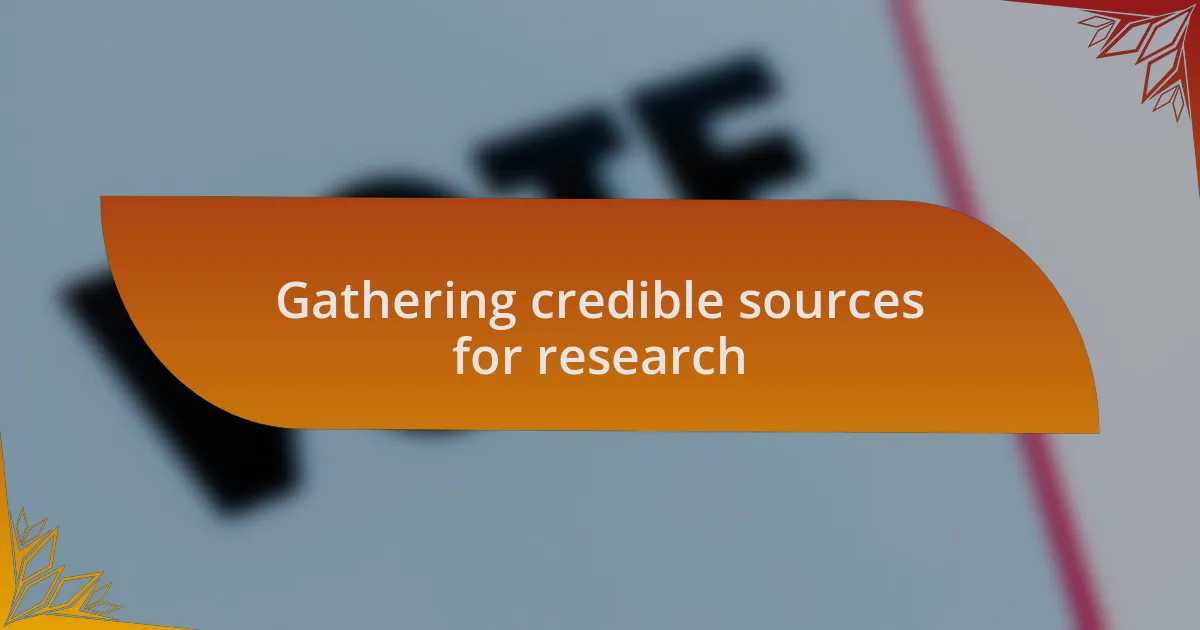
Gathering credible sources for research
Gathering credible sources for research is an essential step in crafting robust reparations proposals. I recall a time when I started to gather information for a presentation. I found myself overwhelmed by the sheer volume of content available online—some incredibly insightful, while much of it lacked reliability. I learned quickly that assessing the credibility of sources is not just about looking at the author’s credentials but also about checking the date, the citations provided, and, importantly, the underlying motivations behind the information.
It struck me how often people might inadvertently trust sources that echo their own beliefs without questioning the foundation of those beliefs. Once, I encountered a study that seemed to validate a strong opinion I held, only to later find it was funded by an organization with a vested interest in the outcome. This taught me that context matters; understanding who funds research can provide significant insight into its biases. What about you—isn’t it important to differentiate between data that genuinely enlightens us and that which merely reinforces our preconceptions?
Moreover, I’ve had experiences where peer-reviewed journals became my best friends in the research process. I distinctly remember the feeling of validation when I discovered a particular article from a respected academic that expertly unpacked systemic issues. It underscored a critical point: credible sources not only lend authority to arguments but also enrich our understanding of the complex web of reparations politics. Isn’t it exciting to think that the right piece of evidence can elevate a proposal from being merely opinionated to fundamentally sound?
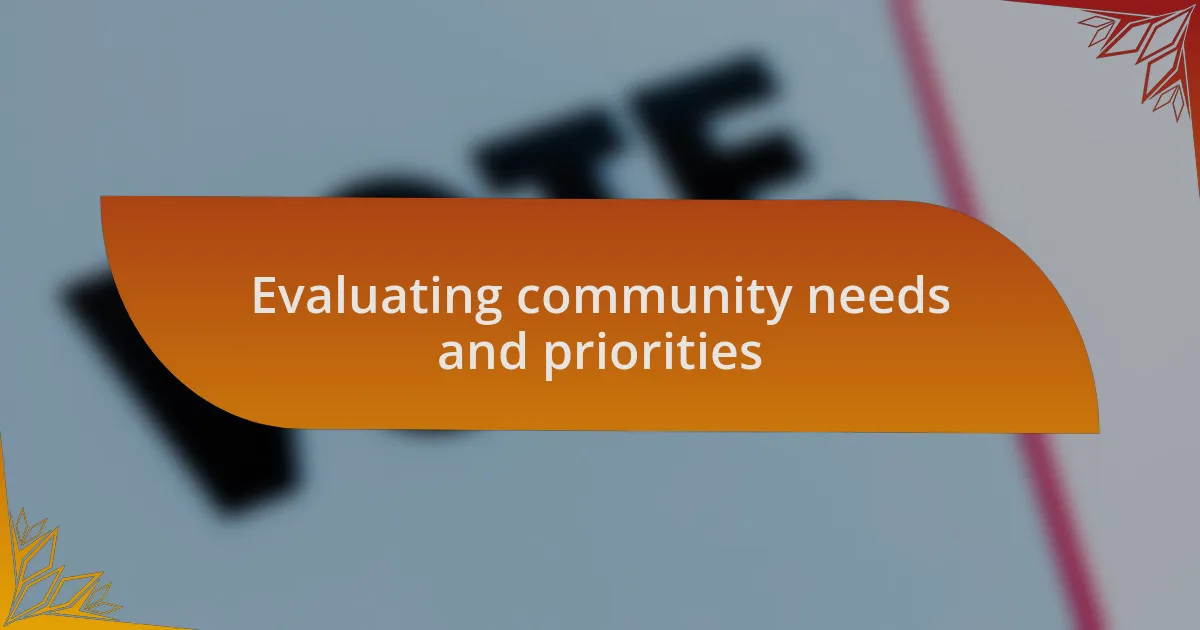
Evaluating community needs and priorities
Understanding and evaluating community needs is crucial when drafting reparations proposals. I vividly recall attending a town hall meeting that focused on community voices. It was eye-opening to witness how diverse the priorities were, with some residents emphasizing educational initiatives while others pointed to health care access. This experience reinforced for me that prioritizing community input means recognizing that needs can vary widely.
In my journey, I found that surveys and focus groups often unveil greater insights than I initially anticipated. When I conducted a simple survey in my neighborhood, what surprised me were the responses about economic opportunities. Many community members expressed feelings of marginalization and a longing for tangible support rather than just symbolic gestures. Isn’t it fascinating how direct engagement can reveal needs that might remain hidden otherwise?
Sometimes, I grapple with the idea of representation. If proposals do not truly reflect the community’s needs, then what purpose do they serve? During a recent workshop, we spent hours translating various opinions into actionable proposals, only to realize that we had inadvertently sidelined voices that were vital to the discussion. This taught me that genuine evaluation requires continuous dialogue and a commitment to inclusivity. How do we ensure that every voice is not only heard but truly valued?
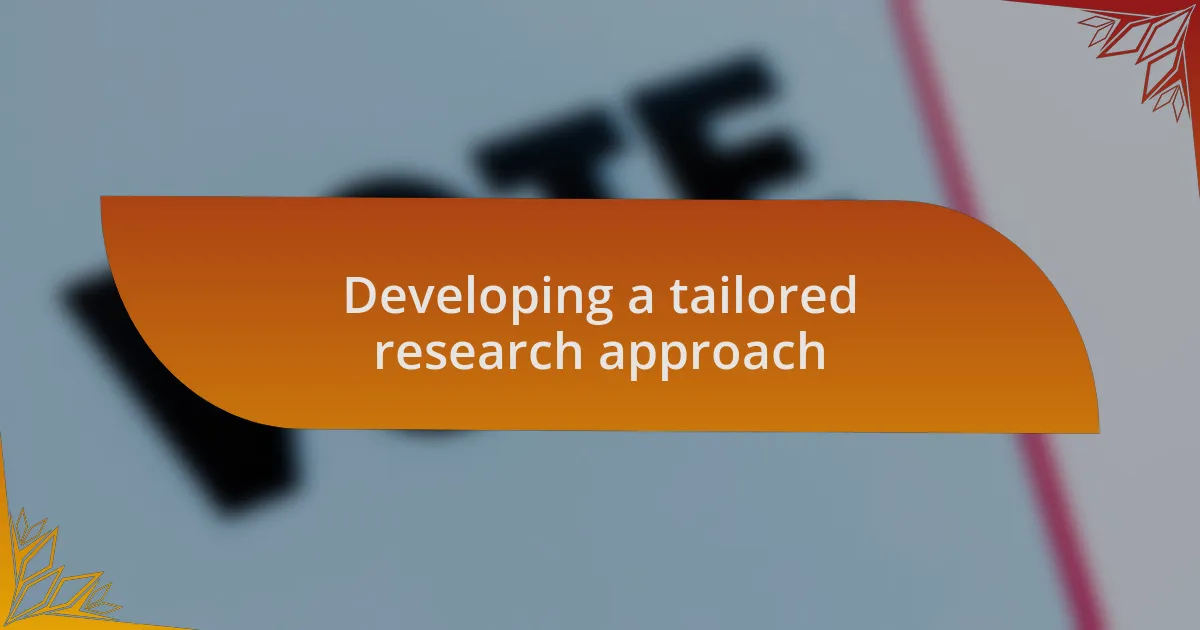
Developing a tailored research approach
When I set out to develop a tailored research approach, I first assess the unique characteristics of the community I’m engaging with. For instance, in one neighborhood I worked with, the historical context shaped their perspectives on reparations significantly. It’s essential to consider how the past informs present aspirations. How can we ensure our research respects and acknowledges this intricate history?
I’ve come to appreciate the power of intersectionality in my research. Different identities within a community can lead to distinct needs and priorities. I remember collaborating with a group of activists where we dissected varying experiences of individuals based on race, gender, and economic status. The conversations were sometimes uncomfortable but ultimately enriching, leading to a more nuanced understanding of what reparative measures might actually resonate. Aren’t the most profound insights often found in spaces that challenge us?
Additionally, it’s vital to incorporate both qualitative and quantitative methods when crafting a research strategy. While data can provide a broad overview, it’s the stories behind the statistics that truly illuminate community sentiments. In a recent project, we blended statistical analysis with in-depth interviews, revealing patterns that numbers alone might have obscured. This dual approach not only enriched our findings but also fostered a connection with community members, making them feel seen and heard. How can we find balance in presenting the data without losing the essence of individual experiences?